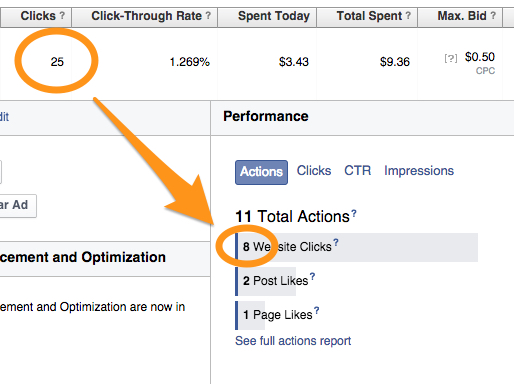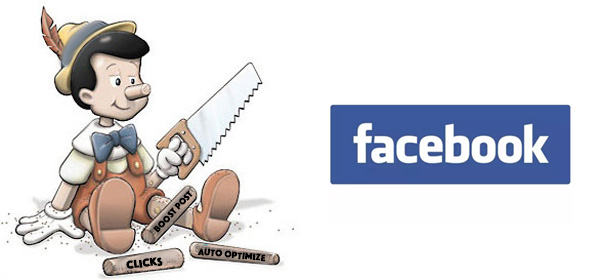After writing about the success of a Facebook campaign two weeks ago, I want to emphasize something. The Facebook Advertising platform is designed to mislead you. This doesn’t mean that Facebook advertising can’t be effective, it can produce results. But you can’t be drawn into thinking that Facebook is your friend or that their goal is to help you, they don’t care.
Avoiding Facebook’s misleading traps can help you build a more effective campaign and measure the real results.
1. Overstated Clicks
If you use Manual CPC (Cost Per Click) bidding for your Facebook Advertising you probably feel like you’re safe. Cost per Click advertising makes us feel warm and cozy. Knowing that we are paying for measurable results has become a cornerstone of digital marketing. It’s common knowledge that when we pay for clicks we are talking about clicks to our website. We want visitors! Do you want to pay each time somebody clicks the screen while your ad is showing? Of course not. But this is exactly what Facebook is doing. They are charging for clicks on the advertisement even if that click doesn’t go to your website. Nobody knows for sure what they consider a “click” but Facebook’s numbers are certainly misleading. See the picture below.

In this picture Facebook has charged me for 25 clicks. Only 8 of those clicks were to my website. What about the other clicks? I have no idea what the viewer clicked. The take-away is to make sure that you are using your own independent analytics software to evaluate results. I’d recommend Google Analytics or KISS Metrics.
2. Auto-Optimized is “Bait and Switch”
You’ve determined that you want to use Cost Per Click (CPC) for your advertising campaign. You start creating your advertisement and the default option is “Get More Clicks at Best Price.” You think, thats exactly what I want. I want as many clicks as I can get at the lowest price. So, you leave it set that way. Unfortunately this is a complete rip off. When you select this option it’s not really Cost Per Click at all, you will pay each time your ad is shown. You are charged even when nobody clicks on it. See the image below.

This campaign was supposed to be optimized for clicks. It has received 0 clicks but has incurred $.66 of cost. To be fair it does say “CPM” in the campaign summary screen shown, but it is very misleading when you are setting up your advertising.
3. Feed Manipulation
When Facebook started the news feed presented the latest content from pages you liked and your friends. It was simple and ordered by time. It made sense, scroll up for the most recent stories. Scroll down to view older content. The problem was that Facebook wanted more influence over the content being presented so they eliminated the time-based news feed. Facebook says this change was to create a more relevant news feed filled with interesting content. The truth is that it’s a way for Facebook to continue milking advertisers. Under the time-based approach once an advertiser captured a “like” they could market to that person for free. This made likes very valuable to an advertiser, it was equivalent to an email newsletter subscriber. It was worth paying to acquire likes because they held long-term value. With Facebook’s feed manipulation the value of likes has been destroyed. When you write a post it won’t be seen by all the people who like your page. The only way you can reach all of the people who already like your page is by using Boosted Posts, which you’ll pay for.
4. Boosted Posts aren’t Advertising
The biggest feature responsible for raising Facebooks revenue is “Boosted Posts.” Whenever you post to your page you are presented with an option to “Boost Post.” It’s really easy to use — you simply set how much your willing to pay and presto! Boosted Posts are the easiest way to start giving Facebook money. Just because it’s easy doesn’t mean its a good decision. In fact, boosted posts are the worst way to spend money on Facebook. I don’t consider Boosted Posts advertising at all. The problem is that posts are designed to inform people that already know you. Posts are not a good way to introduce you to people. I feel like boosted posts totally miss the point of digital marketing. You are displaying the same message to two entirely different targets. Posts should be used to address people who already like your page and know about your company. Boosted Posts should not be used to advertise. You can use Boosted Posts to overcome the Feed Manipulation problem but at that point these fees are more like a tax than advertising.
5. Irrelevant Metrics
Marketers learned long ago that numbers only matter for relevant metrics. For most of us the number of impressions is irrelevant, we want clicks. In their infinite wisdom, Facebook has started fabricating new metrics. The most widely used metric is “Page Post Engagements.” On the surface this sounds appealing. If somebody likes, comments or shares your post that could be worth paying for. However, these “engagements” also include photo views. So, if somebody views the picture in your advertisement it counts. This sure sounds a lot like paying for impressions, it’s just a way to try and make impression based advertising sexy again. Be aware of every metric reported by Facebook. Use your own analytics tracking platform to measure your results!
6. Sales and Conversion Metrics are an Afterthought
Why are you advertising on Facebook? To get more likes? To build your brand? Wrong. You are using Facebook to generate sales. You might be using Facebook to generate an immediate sales lift or you could be looking at a long-term strategy. Regardless, you need to generate a positive ROI from your advertising. Being able to attribute conversions to a Facebook campaign is very important. Unfortunately Facebook doesn’t make this easy. They do offer an option to “Pay Per Conversion” but that doesn’t make sense for most business. I want to Pay Per Click but be able to also track the number of conversions from my campaigns. Surely this should be possible, but I emailed Facebook customer service and they said it’s not. I can track conversions on Cost Per Click campaigns with Google but Facebook doesn’t allow it. This underscores the fact that Facebook doesn’t want to give you relevant data.


